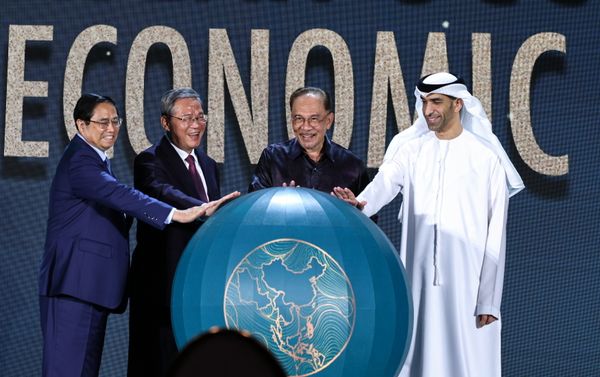By Danial Dzulkifly
SHAH ALAM, June 5 — The newly minted Asean-Gulf Cooperation Council (GCC)-China trilateral pact is being hailed as a “strategic masterstroke” for its role in economic realignment and is seen as part of a broader shift where developing and middle-power nations are asserting greater relevance on the global stage.
The historic summit in Kuala Lumpur, which came against the backdrop of rising United States (US) tariffs, fractured multilateralism, and shifting trade flows, saw the three regions — with a combined GDP of nearly US$25 trillion (RM106.1 trillion) and 2.15 billion people — charting what leaders described as “a more connected, resilient and prosperous” future.
Addressing the summit last week, Prime Minister Datuk Seri Anwar Ibrahim urged the three blocs to leverage their unique strengths and enhance cooperation, amid global uncertainties.
“Our strengths are complementary — labour, capital, innovation. I am confident that Asean, the GCC, and China can draw upon our unique attributes and shape a future that is more connected, more resilient, and more prosperous for generations to come,” he said in his opening remarks, delivered before top leaders from the respective countries.
But beyond the ceremonial optics, analysts believe the move is part of a deeper geopolitical recalibration.
Nusantara Academy for Strategic Research senior fellow Azmi Hassan called the trilateral formation “very significant”, adding that the idea of bringing China into what was initially an Asean-GCC arrangement was both timely and transformative.
“Originally, the concept was limited to Asean and the GCC, as initiated during the Riyadh Summit in 2023.
“But I believe it was Anwar’s strategic thinking, given that Malaysia will chair Asean in 2025, that prompted the idea: since Malaysia and Asean already enjoy strong economic and geopolitical ties with China, why not bring China into the fold?
“In my view, this was a stroke of genius. Incorporating China into this initiative has significantly expanded its potential,” he told Media Selangor.
Azmi noted that the trilateral grouping could evolve into a new model of economic cooperation, especially in a world still unwinding from Trump-era tariffs.
“This collaboration will be incredibly powerful and timely. Asean and the GCC are already effective, but by bringing in China, we are reinforcing this alliance with a major economic force,” he said.
Azmi said Malaysia’s leadership of Asean this year and the drafting of the Kuala Lumpur Declaration 2045 show clear intent, with centrality and neutrality as guiding principles.
“Asean alone is already a significant bloc, but it faces challenges. Its influence grows substantially when it partners with major powers such as China or Russia. Combined with the European Union (EU), Asean — with its population of 690 million — can emerge as an immensely influential bloc.
“But to truly be impactful, Asean needs to adopt a ‘Plus-Plus’ model of cooperation. These ‘pluses’ could include China, Russia, and currently, the EU as well,” he said.
[caption id="attachment_403084" align="aligncenter" width="1310"] Prime Minister Datuk Seri Anwar Ibrahim (centre) attends the Asean-Gulf Cooperation Council-China Economic Forum 2025 in Kuala Lumpur on May 27, 2025. — Picture by BERNAMA[/caption]
Prime Minister Datuk Seri Anwar Ibrahim (centre) attends the Asean-Gulf Cooperation Council-China Economic Forum 2025 in Kuala Lumpur on May 27, 2025. — Picture by BERNAMA[/caption]
Geopolitical realities
For Singapore Institute of International Affairs senior fellow Oh Ei Sun, the trilateral summit reflects the ambition of developing nations to punch above their geopolitical weight, albeit with limited outcomes in terms of hard security or diplomacy.
“Amidst these economic uncertainties, I think many major developing countries and middle powers are eager to present themselves as significant players on the global stage, much like a number of former colonies did in the 1950s, culminating in the Bandung Conference in 1954.
“Yet, many of them remain plagued by poverty and coups to this day,” he said.
While China may welcome the formation of the trilateral pact, Oh believes the GCC is still hedging its bets and maintaining ties with Washington.
“China would certainly like to see that (cooperation). But the GCC has just rolled out the purple carpet for Trump, and individual Asean countries are scrambling to negotiate new trade terms with the US. It is unlikely to have an appreciable effect on the ongoing South China Sea disputes,” he said.
The summit at the Kuala Lumpur Convention Centre, despite being largely held behind closed doors, signalled a pivot in tone and ambition for Asean diplomacy.
Reflecting this assertiveness, Anwar also confirmed he had written to the White House seeking an Asean-US summit, underscoring the bloc’s desire to present a united voice amid growing unilateralism.
He also called for the implementation of real outcomes, not just “pronouncements”, pointing to trade agreements like the upgraded Asean Trade in Goods Agreement and the Asean Digital Economy Framework Agreement, due later this year.
“There is a seriousness, a determination, a collective will to deliver concrete results, and everything must be in the name of Asean,” Anwar said.
[caption id="attachment_403086" align="aligncenter" width="1331"] Prime Minister Datuk Seri Anwar Ibrahim (centre) with fellow world leaders during the second Asean-Gulf Cooperation Council (GCC)-China Summit at the Kuala Lumpur Convention Centre in Kuala Lumpur on May 27, 2025. — Picture by BERNAMA[/caption]
Prime Minister Datuk Seri Anwar Ibrahim (centre) with fellow world leaders during the second Asean-Gulf Cooperation Council (GCC)-China Summit at the Kuala Lumpur Convention Centre in Kuala Lumpur on May 27, 2025. — Picture by BERNAMA[/caption]


